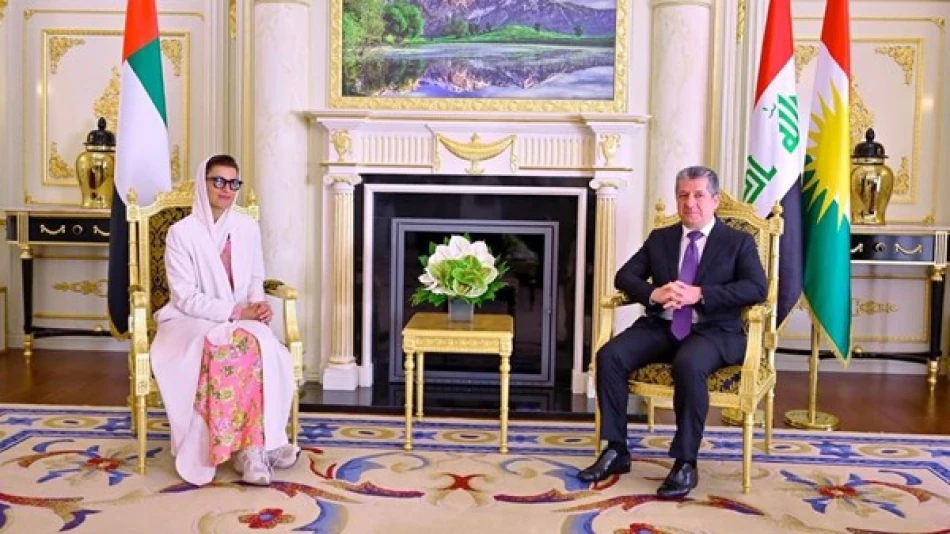
Kurdistan Regional Government Prime Minister Welcomes Noura Al-Kaabi for High-Level Talks
UAE-Kurdistan Partnership Deepens as Mosul Cultural Sites Reopen After ISIS Destruction
The Kurdistan Regional Government's Prime Minister Masrour Barzani met with senior UAE officials this week to strengthen bilateral ties, coinciding with the official reopening of restored cultural heritage sites in Mosul. The meeting underscores the UAE's growing influence in Iraq's reconstruction efforts and signals deeper Gulf engagement in the post-ISIS recovery phase.
High-Level Diplomatic Exchange Reinforces Strategic Partnership
During the meeting, UAE Minister of State Noura bint Mohammed Al Kaabi and Minister of Culture Sheikh Salem bin Khalid Al Qasimi discussed expanding cooperation frameworks with Kurdistan's leadership. The talks focused on mutual interests spanning political, economic, cultural, and humanitarian sectors.
Al Kaabi conveyed greetings from UAE President Sheikh Mohammed bin Zayed Al Nahyan, Vice President Sheikh Mohammed bin Rashid Al Maktoum, and Deputy Prime Minister Sheikh Mansour bin Zayed Al Nahyan. Barzani reciprocated with similar high-level diplomatic courtesies, reflecting the formalized nature of UAE-Kurdistan relations.
Mosul's Cultural Renaissance: A Symbol of Post-Conflict Recovery
The diplomatic meeting occurred alongside the inauguration of several restored cultural and heritage sites in Mosul, funded by the UAE in partnership with UNESCO. This initiative, part of the broader "Revive the Spirit of Mosul" program, represents a significant milestone in rebuilding Iraq's second-largest city after its liberation from ISIS in 2017.
Strategic Investment in Iraq's Stability
The UAE's commitment to Mosul's reconstruction extends beyond cultural preservation. By investing in heritage sites destroyed during ISIS occupation, the Emirates positions itself as a key stakeholder in Iraq's long-term stability. This approach mirrors successful Gulf state strategies in other post-conflict regions, where cultural investment serves as a foundation for broader economic partnerships.
Regional Implications and Economic Opportunities
The UAE-Kurdistan relationship reflects broader regional dynamics as Gulf states seek to expand influence in Iraq's autonomous Kurdish region. Kurdistan's relative stability and natural resources make it an attractive partner for Emirati businesses looking to establish footholds in Iraq's recovering economy.
Comparative Regional Strategy
Similar to its investments in Jordan's archaeological sites and Lebanon's cultural institutions, the UAE uses heritage preservation as diplomatic soft power. This strategy has proven effective in building lasting partnerships while supporting regional stability—a model that contrasts with more militaristic approaches seen elsewhere in the Middle East.
Looking Forward: Infrastructure and Investment Potential
The meeting signals potential expansion of UAE involvement in Kurdistan's development projects. Given the Emirates' expertise in logistics, tourism, and urban development, future cooperation could encompass airport modernization, hospitality infrastructure, and energy sector partnerships.
For investors and regional observers, this deepening relationship suggests Kurdistan's continued integration into Gulf economic networks, potentially offering new opportunities as Iraq's federal government works to balance various international partnerships while maintaining sovereignty over its reconstruction priorities.
Most Viewed News

 Layla Al Mansoori
Layla Al Mansoori






